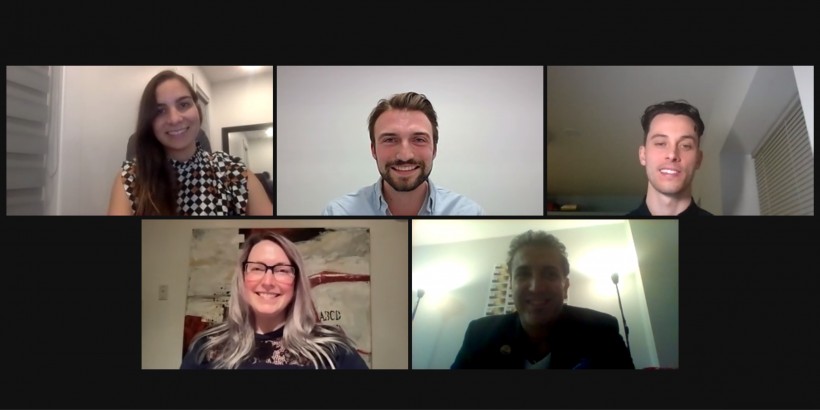Medtech and biotech companies were dominant at Wednesday’s Volta Cohort pitch competition, with all five winners pitching products with healthcare applications.
The victors triumphed in a field of 14 finalists to bag up to $25,000 in the short-term in prize money and entrance into the Volta Cohort accelerator program. They will be eligible for another $25,000 in six months if they stay in the program and meet a set of prescribed growth milestones.
Volta started holding its biannual Cohort events nearly four years ago, with Wednesday’s pitch competition being the ninth. So far, there have been 44 winners. The Cohort accelerator includes mentorship services and office space at Volta or another Atlantic innovation hub.
““Atlantic Canada is a region for innovation, entrepreneurial talent and big ideas – and the Volta Cohort Pitch Competitions continue to show that," said Volta CEO Martha Casey in a statement. "The calibre of companies and the significant impact they will make on various industries and sectors is incredibly impressive. We’re thrilled to be supporting these founders.”
Here’s a look at the victorious companies:
St. John’s, NL
Mandy Woodland, co-founder
Amp has developed an app, called Struggle, that uses artificial intelligence and behavioural modification to help pre-diabetic people avoid becoming fully diabetic. The system will use a process called federated learning -- which trains algorithms on multiple devices without sending data back to a central computer -- in order to protect user privacy.
“Unless people with pre-diabetes change their lifestyle, most will have Type 2 diabetes within the next 10 years,” said Woodland. “There’s also a significant rise in the prevalence of pre-diabetes among adolescents and young adults.
"This is an unfortunately massive and growing market.”
HOLLO Medical
Halifax, NS
David Hodgson, CEO and Sara Fedullo, COO
HOLLO is developing a spacer for use with asthma inhalers that is small enough to fit in a child’s pocket, unlike existing, cumbersome products. Hodgson said the device will be simpler to manufacture than conventional spacers and the regulatory approval process will be simplified by the fact that the technology’s underlying mechanism is already approved and widely used.
“One in 12 children have asthma,” said Fedullo. “Their first line of treatment is a pressurized inhaler and spacer... but their cumbersome size correlates with function, so they tend to be quite big.
“They’re a source of embarrassment and stigma for children, reducing compliance and leading to hospitalization and school absenteeism.”
Halifax, NS
Sayedali Mousavi, CEO and Arash Helmi, CMO
MOC has developed technology for 3D printing medical implants and other items compatible with human biology -- “bioprinting” -- including both hard, structural implants and scaffoldings for tissues and organs.
“My uncle died in the U.S. in suffering in a transplant waiting list in 2015, and he was not alone,” said Mousavi. “Each day, 17 people are dying in the U.S., and 2,376 Canadians die each year in the same conditions.
“Moreover, artificial organs are needed for drug and vaccine discovery... Our solution is a hybrid bioprinter -- the first patented hybrid bioprinter.”
Myomar Molecular
Halifax, NS
Rafaela Andrade, CEO
Myomar is developing technology for tracking muscle health and muscle loss via chemicals in people's bloodstreams. The system will rely on a quick-acting chemical reaction, similar to a pregnancy test.
“Because all the research that has been done so far was in animal models, we have a proof-of-concept in the animals,” said Andrade in a September interview. “Therefore, we need to move into human trials.
“And then, as soon as we prove that we can detect the biomarkers and correlate them with muscle atrophy in humans, then we are going to move into the regulatory path to gain approval for large-scale clinical trials, and eventually, commercialization.”
Fredericton, NB
Pascal McCarthy, CEO
Parados has developed a data analytics platform for tracking and preventing head injuries in sports by using sensors to monitor the forces an athlete’s head is subjected to. The company grew out of McCarthy’s work researching head injuries with the Concussion Legacy Foundation Canada. He said high-performance youth sports will be the company’s beachhead market.
“Today, brain injuries are still barely understood, which is why somewhere between 50 and 80 percent go undiagnosed, amounting to over 4 million untreated cases in the U.S. alone every year.
“The problem is in every wing of the military, but even more so in young athletes, where the concussion rate has more than doubled since 2005.”










